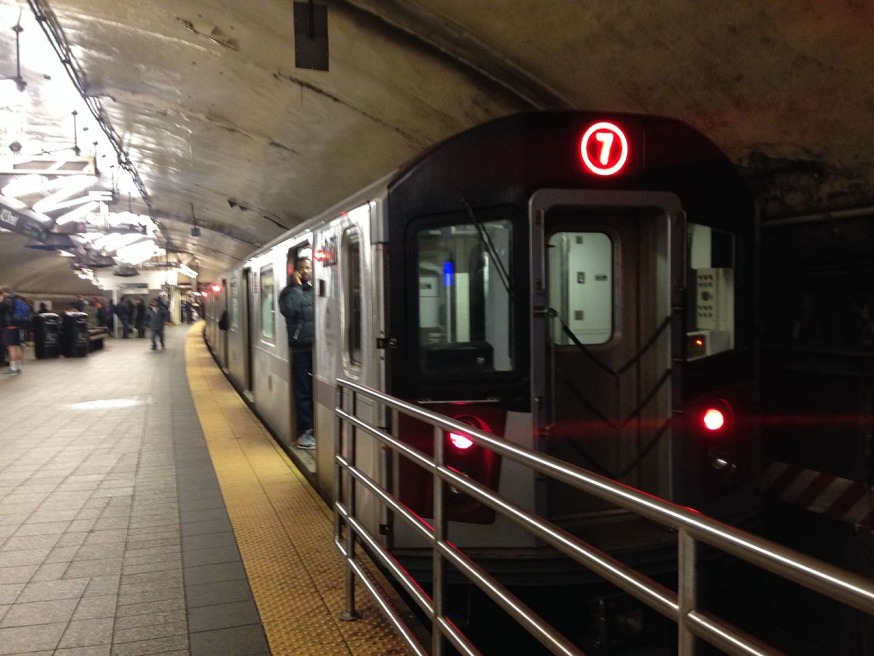
7 train pulling into station. The MTA plans to pilot barriers at three stations– including at the Times Square station on the 7-train platform (Photo: R38R40 CC BY-SA 4.0))
Feb. 23, 2022 By Christian Murray
The MTA plans to install barriers at three subway stations—including one on the 7-train platform in Times Square— that will block access to the tracks.
The barriers, also known as platform screen doors, will also be installed at the Sutphin Boulevard-JFK station on the E-line as well as at the Third Avenue station on the L line in Manhattan.
“We’re going to be piloting platform doors at three stations where the engineering does work,” said MTA chief Janno Lieber on NY1 Wednesday morning. However, given current engineering, he said they would not “work at a lot of places.”
The pilot program would create a barrier between the platform and the tracks as a means to protect riders from being pushed or falling in front of trains.
The announcement comes in response to calls for the barriers following a series of attacks where straphangers were pushed off the platforms in front of trains.
In January, Michelle Alyssa Go, 40, was fatally shoved in front of the train while standing on the R train platform in Times Square.
Advocates have called on the MTA to add the barriers, noting that they are prevalent in Europe and Asia.
The MTA has historically rejected the idea, saying it would be too costly and it would not work, given the age of the 104-year-old system and its size–with 472 stations and 665 miles of track.
However, a task force was created in December after Lieber said there was an increase in attacks.
“Months ago, I started seeing that the number of people getting on the tracks and in the tunnels was going up….So I created an interagency group at the MTA to study it,” he told NY1.
Lieber did not give an estimate of how much the platform doors would cost.
He said the agency will also be testing new technology to detect if there is a person on the tracks.
“We’re also going to be piloting new technologies to detect track incursion using thermal technology, using laser technology, so we can know quicker when people get on the tracks and hopefully, interdict that kind of behavior,” he said.
3 Comments

Where did the $1billion set aside for mental health go? Perhaps a formal inquiry should be done into the former Mayor’s wife and her spending.
Take the $100mm and use it for MTA officers to patrol stations and cars. Enforce vagrancy laws again. Relocate homeless and EDP/unstable individuals to mental health facilities. Installing doors does not resolve the issue.
There are better ways for the MTA to spend $100 million dollars than the installation of platform gates at three NYC Transit subway stations. Worse, would be spending billions more to do the same at even more stations. The MTA estimates it would cost $7 billion to install barriers at the 128 of 472 system wide stations that could physically accommodate them. This would do little to attract all five million plus pre COVID-19 NYC Transit subway riders. Better to spend these funds for more transit police. They could assist the the MTA in dealing with the far more frequent daily occurance of muggings, robbery, fare evasion, vandalism, urination, defecation, panhandling and the homeless taking over whole subway cars or sleeping on platform benches. This adversely impacts both commuters and NYC Transit employees. Investing $100 million would go a long way toward paying to assign a transit police officer to ride each train and patrol all 472 stations. Installation of security cameras on trains and more stations would serve as a better deterrent against crime, fare evasion and vandalism. There is also the need to increase fines and penalties as a deterrent for those who don’t pay their fare, commit assaults or vandalism. Manhattan District Attorney Alvin Bragg and other DA’s must follow up and prosecute those who commit these acts. End revolving door justice when the same criminals are released without bail. Too many return to our transit system within days to commit the same offenses.
(Larry Penner — transportation advocate, historian and writer who previously worked for the Federal Transit Administration Region 2 New York Office. This included the development, review, approval and oversight for billions in capital projects and programs for the MTA, NYC Transit, Long Island and Metro North Rail Roads, MTA Bus, NYC Department of Transportation along with 30 other transit agencies in NY & NJ).